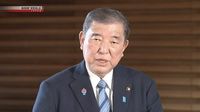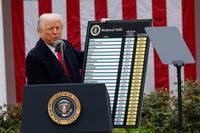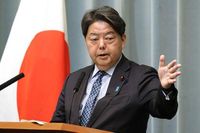On April 3, 2025, Japan's Chief Cabinet Secretary Yoshimasa Hayashi publicly criticized U.S. President Donald Trump’s recent announcement of a 24 percent reciprocal tariff on Japanese imports, expressing deep regret over the decision. During a news conference, Hayashi emphasized the necessity for the United States to reconsider its measures, stating, "I conveyed my extreme regret and strongly requested that the U.S. review its measures." He raised concerns regarding the tariff's alignment with the World Trade Organization (WTO) Agreement and the Japan-U.S. Trade Agreement, highlighting potential ramifications for the economic relationship between the two nations.
Hayashi warned that the tariffs could significantly impact not only bilateral economic ties but also the broader global economy and the multilateral trade system. He refrained from detailing any retaliatory measures Japan might consider, saying, "I will refrain from revealing the specifics of the response under consideration." However, he assured that Japan would establish a consultation service and provide financial support for domestic companies affected by the tariffs.
On the same day, Trump announced a uniform 10 percent tariff on all countries, effective April 5, 2025, with higher tariffs to follow on nations with elevated trade barriers starting April 9, 2025. The reciprocal tariff on Japan is set at a striking 24 percent, a move that has taken many by surprise.
Japan's Trade Minister Yoji Muto also weighed in on the situation, calling for a "careful, yet bold and speedy approach" to the government's response to the tariffs. He indicated that while retaliation measures are being considered, the government must act thoughtfully to determine the best course of action. Muto stressed that this requires a calm and rational judgment, underscoring the delicate nature of international trade relations.
Prime Minister Ishiba Shigeru expressed his disappointment over the tariffs during a press briefing, characterizing the decision as extremely regrettable, especially given Japan's efforts to prevent such unilateral actions. He noted that Japan has been the world's largest investor in the U.S. since 2019, with Japanese automakers investing approximately $418 million and creating around 2.3 million jobs in the United States.
"Washington's wide-ranging restrictive trade measures will have a significant impact not only on bilateral economic relations but also on the global economy and the multilateral trade system," Ishiba remarked. He also pointed out concerns regarding the consistency of the tariff with WTO rules and the Japan-U.S. trade agreement.
When asked if he would seek dialogue with Trump, Ishiba stated he would not hesitate to engage in discussions if the situation warranted it. In response to the tariffs, the Japanese government has initiated measures to support affected domestic industries. This includes setting up approximately 1,000 consultation centers nationwide to assist small and medium-sized enterprises grappling with the fallout from the tariffs.
Furthermore, the government plans to dispatch officials to regions where the auto industry is concentrated to assess the tariffs' impact more effectively. Ishiba assured that the government would also aid struggling businesses in meeting their funding needs, demonstrating a proactive approach to managing the economic consequences of the tariffs.
As the situation unfolds, both Japanese officials and businesses are bracing for the potential economic fallout from the tariffs. The Japanese government is under pressure to respond decisively while maintaining a careful balance in its trade relations with the U.S.
In conclusion, the newly imposed tariffs by the U.S. on Japan mark a significant escalation in trade tensions between the two nations. As Japan navigates this challenging landscape, the government’s commitment to supporting its domestic industries will be crucial in mitigating the impact of these tariffs and preserving the integrity of its economic relationships.






